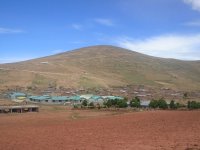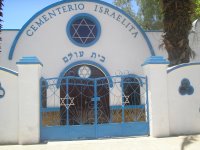As I sometimes have quite a lot of time on my hands due to the infrequent nature of the work with Tecnologias en Desarollo, I have been looking around for other things to keep me busy. I was introduced to a Belgium, Robert Crespin, who founded K’anchay (it’s Quechua and means to give light), an NGO that works in the northern part of Potosi, just about the poorest part of Bolivia. Robert like so many of the foreigners here only planned to stay in Bolivia for a short time - 2 years in his case – and is soon to complete his 16th year. Maybe a tale there for someone.
Anyway, I agreed that I would spend some time in one of their projects though clearly something was lost in translation as when we arrived last wednesday I was slightly surprised to find myself being left in a boarding school. The school in question is located in Vila Vila, I think they named it twice in the hope it might make it on to a map, it didn’t. While I am tempted to say is in the middle of nowhere, I learnt that some of the 80 pupils who attend (age range 4 to 22) actually have to walk or cycle up to 8 hours to get there. They live in the middle of nowhere.
 To give you an idea of Vila Vila, it has 400 residents, one telephone (solar powered), one shop (sells what looks like out of date biscuits), kind of has electricity and virtually no money economy - people lead a subsistence way of life and barter or swap things. I say ‘kind of electricity’ as a power line was installed in the village this year but no one can actually afford the connection fee (about $90). Some of the adults will go to work in one of the cities in order to earn enough money to pay for connection, hopefully in time for the World Cup. I did not want to point out they will then have to pay the monthly electricity bills.
To give you an idea of Vila Vila, it has 400 residents, one telephone (solar powered), one shop (sells what looks like out of date biscuits), kind of has electricity and virtually no money economy - people lead a subsistence way of life and barter or swap things. I say ‘kind of electricity’ as a power line was installed in the village this year but no one can actually afford the connection fee (about $90). Some of the adults will go to work in one of the cities in order to earn enough money to pay for connection, hopefully in time for the World Cup. I did not want to point out they will then have to pay the monthly electricity bills.
 The buildings and layout resemble some kind of army camp. While the school awaits the mains electricity connection, solar power provides electricity for three hours every time – the rest of the village sleep at 7pm when it gets dark. Lights out at 10pm and showers once a week also accentuate the military feel. However the care, positive values and affection with which Santiago and his team run the school is anything but military. In terms of the curriculum, the pupils are taught traditional things like reading and writing as well as harvesting, growing fruit and vegetables and even cooking skills.
The buildings and layout resemble some kind of army camp. While the school awaits the mains electricity connection, solar power provides electricity for three hours every time – the rest of the village sleep at 7pm when it gets dark. Lights out at 10pm and showers once a week also accentuate the military feel. However the care, positive values and affection with which Santiago and his team run the school is anything but military. In terms of the curriculum, the pupils are taught traditional things like reading and writing as well as harvesting, growing fruit and vegetables and even cooking skills.

During my four days, I played football and basketball with the kids, helped plant pine trees, gave an English lesson to a class of forty, made bread and emptied the store room in search of two mice that had been spotted roaming about. It was a really good experience, it was really my first experience of spending any prolonged time with indigenous Bolivians. Sad but true, life in the city is very sheltered, or at least in the part I live. If it sounds like I was very busy, this was not the case. Over half the time there were no tasks for me to do and I had to fight the odd bout of boredom. I am truly a city boy used to radio, tv, internet, bars etc.
As for teaching English, I really had to question the value of doing this. So they did not know the capital of England is London, nobody had even heard of Scotland or Wales, as well as lacking other general knowledge we would consider quite basic. So they may not do very well in Trivial Pursuit. On the other hand, I would not know the first thing about how to build a wall, grow tomatoes or bake bread. These are practical skills, which they need to live. On the other hand they seemed to enjoy the class, and they know who Harry Potter is.
Then there was my journey back to Cochabamba… While I arrived in relative comfort via a 6 hour journey in a 4x4, my return commenced on saturday evening on the back of a motorbike (backpack and all) to Sacaca, 8 miles away. In Europe, people would call my ride a cross country obstacle course though out here it is a typical Bolivian carriageway. I would like to describe the experience as hair raising but as it started raining half way through to add to the ‘fun’, my hair was in fact firmly pasted to my forehead. I was quickly sent to bed – about 8pm – as I was due to get up at 3.30am to catch a truck to Cochabamba. In fact I could have had an hour extra beauty sleep, the truck had no space, and I had to wait an hour for the coach which was heading to Oruro. The coach seated 40 though we stopped what seemed like every 10 minutes to pick up another passenger until I counted about 70. I swear that we took one particularly sharp bend on two wheels. We were dropped off on the outskirts rather than at the bus station in Oruro and my fellow passenger, who looked like she was about 10, decided she would be my guide. I felt like telling her she should not talk to strangers, even nice ones, but instead let myself be led to the main bus terminal and bought her breakfast before heading off on my second four hour bus journey. This one was pretty uneventful, apart from a half an hour delay when we all had to dismount due to a flat tyre. Home sweet home!















